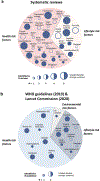Artificial intelligence for dementia prevention
- PMID: 37837420
- PMCID: PMC10843720
- DOI: 10.1002/alz.13463
Artificial intelligence for dementia prevention
Abstract
Introduction: A wide range of modifiable risk factors for dementia have been identified. Considerable debate remains about these risk factors, possible interactions between them or with genetic risk, and causality, and how they can help in clinical trial recruitment and drug development. Artificial intelligence (AI) and machine learning (ML) may refine understanding.
Methods: ML approaches are being developed in dementia prevention. We discuss exemplar uses and evaluate the current applications and limitations in the dementia prevention field.
Results: Risk-profiling tools may help identify high-risk populations for clinical trials; however, their performance needs improvement. New risk-profiling and trial-recruitment tools underpinned by ML models may be effective in reducing costs and improving future trials. ML can inform drug-repurposing efforts and prioritization of disease-modifying therapeutics.
Discussion: ML is not yet widely used but has considerable potential to enhance precision in dementia prevention.
Highlights: Artificial intelligence (AI) is not widely used in the dementia prevention field. Risk-profiling tools are not used in clinical practice. Causal insights are needed to understand risk factors over the lifespan. AI will help personalize risk-management tools for dementia prevention. AI could target specific patient groups that will benefit most for clinical trials.
Keywords: artificial intelligence; dementia; machine learning; prevention; risk prediction.
© 2023 The Authors. Alzheimer's & Dementia published by Wiley Periodicals LLC on behalf of Alzheimer's Association.
Conflict of interest statement
Conflicts of interest
VO is a commissioner of the 2017 and the 2020 Lancet Commission on dementia prevention, intervention, and care. DCW has served on advisory boards with Roche, Biogen and Merck. VR has provided consultancy to Biogen. AKL has served on advisory boards with Roche. DPUK is a DEMON partner. All other authors declare no conflicts of interest.
Figures


References
-
- Martin Prince A, Wimo A, Guerchet M, Gemma-Claire Ali M, Wu Y-T, Prina M, et al. World Alzheimer Report 2015 The Global Impact of Dementia An Analysis of Prevalence, Incidence, Cost and Trends 2015.
Publication types
MeSH terms
Grants and funding
LinkOut - more resources
Full Text Sources
Medical

